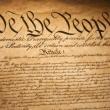Who really elects the president?
The United States Constitution does not allow citizens to directly vote for the president. Even though the election ballots in Maine and in most states will list the names of the presidential candidates, a citizen’s vote actually selects a slate of delegates called “Electors,” not a specific candidate. Electors are elected from all fifty states and the District of Columbia. Although they never actually meet together, these Electors are known collectively as the “Electoral College.”
The Constitution allows each state to elect a number of Electors equal to the sum of members it has in the U.S. House of Representatives plus its two U.S. Senators. These Electors actually elect the president and vice president by voting in the Electoral College. A candidate must obtain 270 votes from the Electors to become president, as 270 is an absolute majority of the 538 Electors in the College today. If no candidate obtains a majority of votes in the Electoral College, the Constitution provides for the president to be elected by the U.S. House of Representatives from the three candidates receiving the highest number of votes in the College. Each state receives one vote in the House election, and the candidate receiving the majority of votes (26) becomes president.
The Constitution does not require Electors to vote for anyone, even the candidate who received the highest popular vote. Instead, Electors are free to vote for anyone they choose. But since the 1830s, most states and the major political parties have adopted laws and rules which require the Electors to vote for the presidential candidate receiving the highest state popular vote, employing a “winner take all” methodology. These laws were enacted to further “democracy” and permit citizens to more directly elect the president. But because they restrict the voting rights of the Electors under the Constitution, such laws are of dubious constitutionality. (Maine is one of only two states whose Electors are chosen by the popular vote in each Congressional District, plus two “at-large” Electors who must vote for the candidate winning the state popular vote.)
The Founding Fathers simply did not trust citizens to elect the president directly, believing the election of the country’s most powerful officer should be insulated from the current passions of the people. They thought that creating a more deliberative process through the Electoral College would prevent “demagogues” or other unqualified candidates from being elected as president. To further insulate the presidential election from the political influence of parties or “factions”, two additional safeguards were included in the Constitution. First, no sitting U.S. Representative or Senator or anyone else employed by the U.S. Government may serve as an Elector. And second, either the presidential or vice presidential candidate selected by each state’s Electors must be a citizen of a different state than that of the Electors.
The rationale for having the president elected by the small group of people constituting the Electoral College was explained by Alexander Hamilton in 1788 — “that the office of President will never fall to the lot of any man who is not in an eminent degree endowed with the requisite qualifications,” because he would be chosen “by men most capable of analyzing the qualities adapted to the station, and acting under circumstances favorable to deliberation…”
Many commentators and opinion polls have concluded that neither major party candidate in the current presidential election is trustworthy or qualified. If they knew how it was intended to operate, how many people would prefer that the Electoral College function in this election as originally contemplated by the Constitution?
Event Date
Address
United States

























